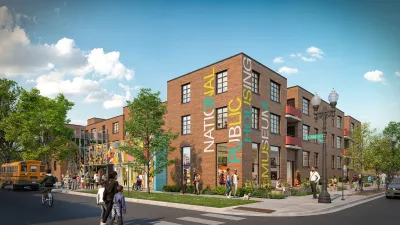Could Vienna's century of experience in creating housing that is both affordable and attractive offers lessons for how the U.S. can address its growing affordability crisis? In the Austrian capital, more regulation, not less, leads to cheaper rents.
While pundits in America lament the role of government regulation in driving up the cost of housing, "[a] unique system nearly a century in the making has created a situation today in which the city government of Vienna either owns or directly influences almost half the housing stock in the capital city," writes Ryan Holeywell. "As a result, residents enjoy high-quality apartments with inexpensive rent, along with renters’ rights that would be unheard of in the U.S."
"The Viennese have decided that housing is a human right so important that it shouldn’t be left up to the free market."
First established in Vienna in the 1920s, "[t]he idea that everyday citizens should have access to not just affordable apartments but also attractive ones -- and that it’s the city’s responsibility to provide them -- continues to this day. There’s a mindset that housing is a way to link residents to their communities and the larger city through design," notes Holeywell.
"Vienna’s government takes an approach to residential development that’s more rigorous and deliberative than many private-sector developers in America. That’s because in the U.S., 'cost is the No. 1 priority,' [architectural historian William] Menking says. In Vienna, it’s just one of four. At the same time, the competition among developers is so fierce -- the result of the city’s land monopoly -- that the result is a very affordable development. 'We were doing some comparisons of public housing in Los Angeles and public housing in Vienna,' Menking says, 'and Vienna was cheaper per square foot than L.A.'”
FULL STORY: Affordable and Luxurious Housing Come Hand in Hand in Vienna

Planetizen Federal Action Tracker
A weekly monitor of how Trump’s orders and actions are impacting planners and planning in America.

Chicago’s Ghost Rails
Just beneath the surface of the modern city lie the remnants of its expansive early 20th-century streetcar system.

San Antonio and Austin are Fusing Into one Massive Megaregion
The region spanning the two central Texas cities is growing fast, posing challenges for local infrastructure and water supplies.

Since Zion's Shuttles Went Electric “The Smog is Gone”
Visitors to Zion National Park can enjoy the canyon via the nation’s first fully electric park shuttle system.

Trump Distributing DOT Safety Funds at 1/10 Rate of Biden
Funds for Safe Streets and other transportation safety and equity programs are being held up by administrative reviews and conflicts with the Trump administration’s priorities.

German Cities Subsidize Taxis for Women Amid Wave of Violence
Free or low-cost taxi rides can help women navigate cities more safely, but critics say the programs don't address the root causes of violence against women.
Urban Design for Planners 1: Software Tools
This six-course series explores essential urban design concepts using open source software and equips planners with the tools they need to participate fully in the urban design process.
Planning for Universal Design
Learn the tools for implementing Universal Design in planning regulations.
planning NEXT
Appalachian Highlands Housing Partners
Mpact (founded as Rail~Volution)
City of Camden Redevelopment Agency
City of Astoria
City of Portland
City of Laramie





























